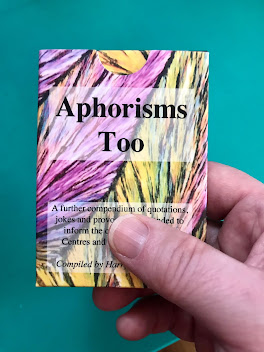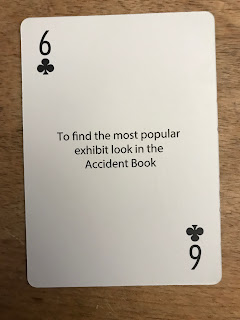Exhibit Aphorisms Too (and a GIVEAWAY!)
Harry White has recently introduced his second card deck of exhibit aphorisms and was kind enough to share some thoughts about "Aphorisms Too" with ExhibiTricks readers.
What are exhibit aphorisms and what are they for?
In 1996 Techniquest started the UK’s first Master’s course in Science Communication based in a Science Centre. It was a great success with students from all around the world, and graduates were quickly snapped up by science centres. I taught the Exhibit Development module but, after a year of PowerPointing the students into submission, I felt that it just wasn’t appropriate to teach a degree about informal education, formally.
“Power corrupts, PowerPoint corrupts absolutely”
Also, whenever I ran out of material for a session, just saying something deliberately controversial would start a debate that would fill the time and engage the students. So, I started collecting these quotations, jokes, and provocations as aphorisms and put 52 of the best/most annoying onto a deck of cards. When the sessions flagged, I’d ask someone to pick a card, read it out and then the group would try and fathom what I was getting at. Most times a heated debate would ensue and my session would go like a charm.
More recently I have used them in consulting with developing science centres around the world. In this circumstance, I started adding quotations from other people in the industry and this has extended the repertoire considerably. But as many of these are well known I have kept them to a minimum of essential ones in the card deck.
The idea of an Aphorism is to put some core truth in a memorably flippant way so that people who are “in the know” recognise it and those who don’t, think about it. As an instructional tool, this has a fatal flaw in that anyone who “gets” it doesn’t need it, and those that need it, don’t get it.
But aphorisms are memorable and anti-intuitive, a bit like a good exhibit.
Also, an omitted Aphorism is that:
“As soon as you print a pack of Aphorism Cards, lots of new, better, more meaningful Aphorisms will be found”
After printing 3 batches of the original Aphorisms card deck, I realised that with 900 packs in circulation, someone must be taking it seriously, or there are a vast number of wobbly desks needing something under one leg out there. So, I felt that I should make some minor corrections for this batch. For instance, originally the Joker Aphorism was:
“A Consultant is a man who borrows your watch and then charges to tell you the time”
and I was that man! But in reality, there are plenty of consultants of both genders and so now I am an equal opportunities insulter.
The first pack of Aphorisms drew from a long list, built up over many years, and naturally I included the ones that I thought were best. In the time since the first "Exhibit Aphorisms" deck was published, I collected even more aphorisms. I did consider combining the first set with the newly collected ones but then which would I leave out? And so, I embarked on the second card set, "Aphorisms Too."
And so, this second batch of “quotations, jokes, and provocations” is perhaps a little less flippant, but it does still try and look at Science Centre life with humour. It is less focused on exhibits than the previous set, reflecting my developing practice in the creation of Science Centres and Children’s Museums over the intervening years.
Here are a few examples from the Aphorisms Too deck with commentary:
Ace of Spades
Pizzey’s Pint Index of Exhibit Excellence
1 to 3 pints
Standard to good ideas
3 to 8 pints
Great ideas that could change the world
Over 8 pints
Brilliant ideas that definitely will change the world, if you can remember what they were.
I remember meeting Steve in a pub near the Science Museum in London and after a very productive exhibit brainstorm we came up with this aphorism and I wrote it in my notebook. Many years later when I was putting this second batch of Aphorisms together, I asked Steve if he minded if I used this and attributed it to him. He didn’t remember the Aphorism at all, which by applying “Pizzey’s Pint Index of Exhibit Excellence” recursively means it must be a really great Aphorism.
There is another, less relevant, anecdote about this “exhibit ideas” session. Steve and I had both been to a pitching session for a new gallery at the Science Museum and as we were leaving Steve wanted to show me his latest toy, a GPS device, which in these pre-smartphone days was pretty cutting-edge stuff. “Look and type in "Pubs Nearby" and immediately it shows me the nearest. So, we set off for the “Hoop and Toy” following the directions from Steve’s device. I expressed my admiration for the technology and Steve said, ”But you haven’t heard the best bit yet! In order to get all the pubs programmed into the device, you have to visit each one and register its location.” You have to go on a pub crawl to enable future pub crawls!
Ace of Hearts
“Playing with clay makes no pots, playing with clay makes potters”
This was the Aphorism that meant I had to make a second pack. It is so good and sums up what we do, it answers all the “But are they learning anything?” complaints perfectly.
2 Hearts
The “Allo, Allo” theory of learning
Loose Objects (LO) = Learning Outcomes (LO)
Simon Nicholson
“Allo, Allo” is an old British comedy programme, it caricatures British attitudes to the Second World War and is a pastiche which includes some pretty dated ideas of comedy, that would not be “PC” nowadays, but it is fondly remembered.
The more loose objects there are in an educational toy, the more degrees of freedom, and the more potential there is for learning. When I was a boy, Lego bricks came in red or white and had 2, 4, or 8 spots; I could build anything my imagination could conceive, and I did, planes, rockets, houses, submarines for mice (best forgotten!). With modern sets the parts are so specific you can only build the DeathStar.
In 1971, Simon Nicholson wrote an article in a Landscape Architecture journal called "How NOT to Cheat Children – The Theory of Loose Parts"
A pile of sand is almost the ultimate experiential learning experience, no wonder kids like the beach.
There is a quote from William Gibson’s book, All Tomorrow’s Parties:
“That which is overdesigned, too highly specific, anticipates outcome; the anticipation of outcome guarantees, if not failure, the absence of grace.”
Ace of Clubs
Safety Engineering
One bad accident could close your centre forever.
If you have 100 exhibits with 100,000 Visitors per annum, there are 10 million visitor/exhibit interactions per year
So, a “one in a million chance” gives almost an accident every month
When working with the staff of Science or Engineering based companies, or universities, often the creation of exhibits based on their technologies is viewed by that staff as “making toys”.
One prototype of a jointly-developed exhibit had a giant “Train Points”-style lever with a sprung return which, when released, hammered into the heavy brass surround, it was a thing of beauty and a deadly finger guillotine.
The co-developers tended to dismiss my concerns, ”No one would be silly enough to put their finger in there” etc. I needed a way to show the risk in a way that fitted with their mindset of engineering precision. And so, this Aphorism was born giving risk as a Parts per million. This approach and the sacrifice of a child’s finger-sized carrot thankfully ended the discussion.
6 Clubs
To find the most popular exhibit look in the Accident Book
A Science Centre is a safe place for Visitors, but the allure of apparent danger is there in many of the most popular exhibits, The Gyro Chair, The Mirror Maze etc. So, as well as being amongst the most used, these exhibits also figure prominently in the institution’s Accident Book. The decision to keep or retire an exhibit on the grounds of safety is one of the trickiest an exhibition manager has to make.
4 Diamonds
Fixing is different from repairing
Repairing is the same thing each time
Fixing is doing something different,
so that you don't keep on repairing
In a Science Centre that develops its own exhibits, the exhibits become a process, evolving to convey the content better to the Visitor and to become easier to maintain. Although we must be careful that making the exhibit easier to maintain doesn’t harm the learning experience. In one Science Museum I worked with the Maintenance Team would gladly have put every interactive in a glass case with a push-button, just to reduce their workload,
Often in SC’s where the exhibits are bought-in, it is harder to change the exhibit to work better without voiding some nebulous warranty and so the Visitor experience cannot be improved.
Queen of Diamonds
Fundraising moves money,
it doesn't make money
If you make money from your own activities, if your organisation is profitable, then you decide what you do with that profit. If you rely on funders then they set your goals, and these may not be compatible with your own or with your long-term viability.
So, look every gift horse square in the mouth before accepting their money. Costs are made up of Capital costs, revenue costs, and legacy costs to the organisation.
Thanks are due to the many practitioners whose words I have mangled for my own use, wherever I can I have given credit to them. I also should thank the many institutions around the world that have gainfully employed me and whose experiences, painful and otherwise, I have tried to distill into short, glib, aphorisms.
Thanks are also due to Paul Orselli of POW! and Sherry Marshall of Science Museum Oklahoma, who encouraged me to get this set done, and to Thorsten Kunnemann of Technorama, the Swiss Science Centre who has employed me and given a platform to these aphorisms in the Exploratory Encounters workshops for those developing their own Science Centres and to my wife, Jen, who has had to endure endless versions of these over many, many years.
I hope that you enjoy them and that they help you to develop your plans, but please don’t take them too seriously.
Any corrections or suggestions can be sent to me at harry.white90@ntlworld.com
AND NOW THE GIVEAWAY!
We'll be giving away 4 prizes to four lucky winners -- 2 sets of both the first and second Exhibit Aphorisms decks, and 2 individual decks of the winner's choice (either the first or second deck.)
There are two ways to enter the giveaway:
1) Become a subscriber to ExhibiTricks by clicking the link at the top right of the blog's homepage, where it says, "Sign up NOW for Free ExhibiTricks Blog Updates."
2) If you are already a subscriber, then send an email to: info@orselli.net with the subject line, "Aphorisms Deck Giveaway."
Enter by July 5, 2022 to be eligible to win one of the four prizes. GOOD LUCK!
Paul Orselli writes the posts on ExhibiTricks. Paul likes to combine interesting people, ideas, and materials to make exhibits (and entire museums!) with his company POW! (Paul Orselli Workshop, Inc.) Let's work on a project together!
If you enjoy the blog, you can help keep it free to read and free from ads by supporting ExhibiTricks through our PayPal "Tip Jar"









